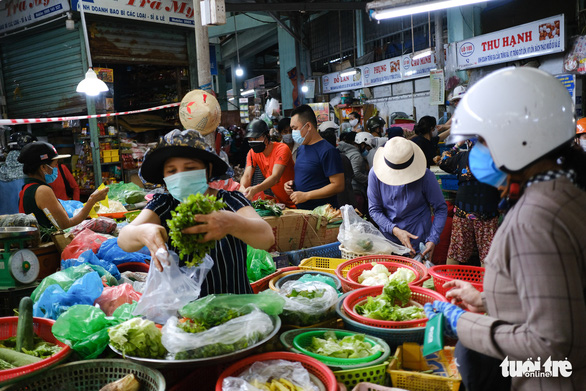After a city leader alluded to citywide movement restrictions to prevent the coronavirus spread in the next few days, residents of Da Nang in central Vietnam on Thursday poured into local wet markets and supermarkets to stock up on groceries.
Da Nang recorded 1,473 coronavirus cases with 13 deaths from July 10 to August 11, said Nguyen Van Quang, secretary of the municipal Party Committee, during a meeting of the People’s Council on Thursday.
Local authorities are mulling more stringent epidemic prevention measures on top of the existing curbs, such as banning people from going to the beach and restricting outdoor travels to essential duties only.
“The People’s Council has settled on a plan to introduce more rigid measures in the ‘stay where you are’ tenet if the situation does not improve over the next four days,” Quang said.
More specifically, city residents will be required to stay home, while factories and construction sites must prepare to let their workers stay on the spot for seven days, he elaborated.
A citywide screening for COVID-19 to pull infections out of the community is also planned.
Following the statement, many Da Nang dwellers flocked to local supermarkets and wet markets to accumulate groceries to prepare for the imminent movement curb.
Many sellers in traditional markets compared Thursday’s footfall to that of the Lunar New Year holiday, the peak season for grocery selling in Vietnam, with the most sought-after items being meat, fish, and veggies.
Tran Thi Chin, a veggie peddler at Dong Da Market in Da Nang, said her stall had sold out early since the demand was upped a few times compared to normal.
Customers could be seen crowding the remaining stalls, vying for the fresh groceries without giving heed to safe distancing.
Likewise, the majority of meat and fish stalls in the market were out of stock early after the demand shot up around 9:00 am.
Hurrying customers, one of them being Le Thi Ngoc Phuong from Dong Da Street of Hai Chau District, could be seen making the way through the crowd with big bags of fresh items.
According to Phuong, she and many other residents had dashed to the grocery stalls as soon as the city leaders discussed the possible elevated movement curb on TV.
A crowd also gathered at Big C Da Nang Supermarket, where the most in-demand items were reported to be groceries, canned foods, and dried foodstuffs.
Refuting rumor of dried-up stocks, the supermarket assured that their supply of veggies, meat, fish, frozen foods, dairy products, dried foods, and instant noodles remains sufficient.
Safety measures such as mandatory distancing and medical declaration are imposed upon all customers, while their staffers are provided with gloves, face masks, and the lines at their check-out counters are marked with tape to remind customers not to cluster up while they wait to pay.
The epicenter of the second coronavirus outbreak in July and August last year, Da Nang has recorded 1,801 local COVID-19 cases since the fourth wave hit Vietnam in late April.
Like us on Facebook or follow us on Twitter to get the latest news about Vietnam!





















































